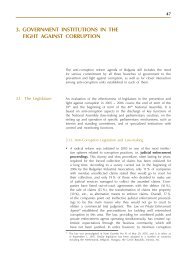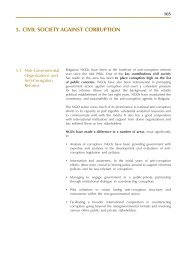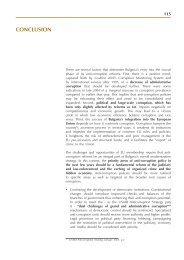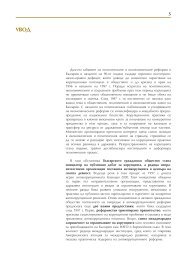National Threat Assessment 2008. Organised Crime - Politie
National Threat Assessment 2008. Organised Crime - Politie
National Threat Assessment 2008. Organised Crime - Politie
Create successful ePaper yourself
Turn your PDF publications into a flip-book with our unique Google optimized e-Paper software.
not planning to commit the violations, but were confronted with setbacks<br />
during the remediation, perhaps because the survey was not extensive enough,<br />
because they were unable to perform the remediation properly, because they<br />
were put under pressure by the customer or because they did not have enough<br />
time or money to do the job properly. This group of offenders includes<br />
employees of municipal authorities that try to save money for the community.<br />
Municipalities often have a limited budget for soil remediation. In some cases<br />
the offenders in this category are not sufficiently aware of laws and regulations,<br />
and the illegal activities can be attributed to incompetence.<br />
The latter group commits crimes of an organised nature. They make as much use<br />
as possible of the opportunities for committing crimes and make as much money<br />
as possible from those crimes. One example involved a company that acted<br />
illegally during a soil remediation operation and made a profit of 750,000 euros.<br />
The fine imposed afterwards was (a mere) 15,000 euros.<br />
A company supplied contaminated soil to a soil cleaning company.<br />
This company paid between 30 and 40 euros per cubic metre for the heavily<br />
contaminated soil to be processed. The soil processing company sold the soil<br />
(without cleaning it) to another company via contacts with a former employee.<br />
The company purchasing the soil was compensated for accepting the<br />
contaminated soil, which generated an unlawful profit of 150,000 euros.<br />
This allowed the soil cleaning company to save 35 euros per cubic metre.<br />
The unlawfully obtained profit made by the soil cleaning company was<br />
estimated at 400,000 euros. Investigations also revealed that incorrect permits<br />
were used and that the supervisor must have been aware of the illegal<br />
activities. The company intimidated the municipal supervisor to ensure that<br />
he took no action.<br />
3.4.5 Consequences for Dutch society<br />
Soil remediation crime harms the living environment and may have a direct<br />
effect on public health. However, the risk to public health differs depending<br />
on the substance, the period of exposure and individual physical characteristics,<br />
which means that exact figures about the damage to public health in the<br />
Netherlands caused by soil remediation crime cannot be established. The value<br />
of a house can drop sharply if it is found to be built on contaminated land.<br />
This can lead to social unrest. Another effect is a loss of trust in the government,<br />
as the government is responsible for the issuing of permits, as well as for<br />
enforcement and supervision. By not following the rules a number of companies<br />
are able to work more cheaply than their competitors, which constitutes unfair<br />
chapter 3 – Fraud and money laundering<br />
117








